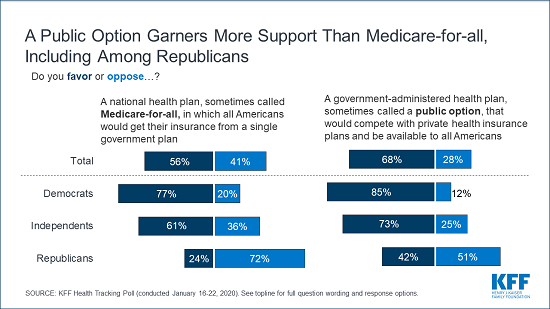
The independent source for health policy research, polling, and news.
Poll: Democrats Like Both the Public Option and Medicare-for-all, But Overall More People Support the Public Option, Including a Significant Share of Republicans
President Trump’s Marks for his Efforts on Drug Costs and Other Health Care Issues Lag His Overall Job Approval Ratings, But Republicans Approve
Lowering Drug Costs and Maintaining Pre-existing Condition Protections Top Public’s Health Priorities for Congress
With the first votes of the 2020 Democratic presidential primary season approaching, large majorities of Democrats – and most of the public overall – support both of the major approaches primary candidates have put forward to expand coverage and make health care more affordable, though a public option remains significantly more popular than Medicare-for-all, the latest KFF Health Tracking Poll finds.
A “public option”, in which a government-administered health plan would compete with private health insurance and be available to all Americans, garners support from 85% of Democrats and 68% of Americans overall. Smaller majorities favor a national Medicare-for-all health plan (77% of Democrats and 56% of Americans overall).
Most independents also favor both approaches (73% public option, 61% Medicare-for-all). While most Republicans oppose both, 42% support a public option.
“After months of debate, Democratic voters support both a public option and Medicare-for-all, but more independents and Republicans are open to the public option,” KFF President and CEO Drew Altman said. “That support could become important in the general election and beyond.”
Large majorities think that taxes for most people would increase under both a Medicare-for-all plan (83%) and a public option (81%). People are more likely to say that all Americans would have health coverage under Medicare-for-all (62%) than under a public option (53%), while larger shares expect people with employer-sponsored coverage or who buy their own insurance to be able to keep their plans under a public option than under Medicare-for-all.
Following six months of news coverage of the Democratic presidential debates and campaign, the poll finds that the public – especially Democrats – are more aware of the potential impacts of Medicare-for-all now than they were in June.
Democrats are now more likely to say that individuals and employers would not continue to pay health insurance premiums under Medicare-for-all (53% now vs. 31% in June), and that people would not face deductibles or other cost sharing (36% vs. 25%). Similarly, Democrats are now more likely to say that under Medicare-for-all people with employer-sponsored insurance would not be able to keep their current plans (41% vs. 25%) and that people who purchase their own plans would not be able to keep their current coverage (40% vs. 24%).
On Drug Prices, President Trump Garners Low Marks from the Public, But Base Remains Supportive
Recent news reports suggest President Trump has raised concerns about polling showing higher marks for Democrats than for him on health care issues, including his efforts to lower prescription drug prices. The new poll finds his job approval on addressing drug costs (30% approve) lags his overall job approval (42% approve).
While polls generally show President Trump gets his highest marks for handling of the economy, the poll finds the public gives him lower-than-average approval numbers on most health issues, including the Affordable Care Act, protecting people with pre-existing conditions, and Medicaid (35% approve of each).
Majorities of Republicans approve of President Trump’s performance on health care issues – while Democrats overwhelmingly disapprove. Independents are more likely to disapprove than approve overall and on each health care issue.
Lowering Drug Costs, Pre-Existing Condition Protection Top Health Priorities for Congress
“It’s becoming abundantly clear that the high price of prescription drugs is the top health care priority that the public, across the political spectrum, wants Congress to take on,” said Mollyann Brodie, a KFF executive vice president and executive director of public opinion and survey research.
Other findings include:
- Half of the public (53%) this month hold favorable opinions of the ACA while 37% hold a negative opinion of the law, a split that has been relatively stable over the past two years since the failed Republican effort to repeal the 2010 health law.
- Few (9%) Americans say they have heard “a lot” about a pending court case that seeks to overturn the entire ACA, including its pre-existing condition protections. A federal judge ruled last year that the entire law should be invalidated, though a federal appeals court in December sent the case back to the judge to reconsider if any parts of the law should stand. The Supreme Court declined an expedited review of the case.
- Most Americans are at least somewhat worried that they or someone in their family would lose coverage if the Supreme Court eventually overturns the entire ACA (58%) or just its protections for people with pre-existing conditions (57%). While majorities of Democrats and independents worry about such coverage losses, most Republicans say they are not too or not at all worried.
Designed and analyzed by public opinion researchers at KFF, the poll was conducted January 16-22, 2020 among a nationally representative random digit dial telephone sample of 1,212 adults. Interviews were conducted in English and Spanish by landline (303) and cell phone (909). The margin of sampling error is plus or minus 3 percentage points for the full sample. For results based on subgroups, the margin of sampling error may be higher.
